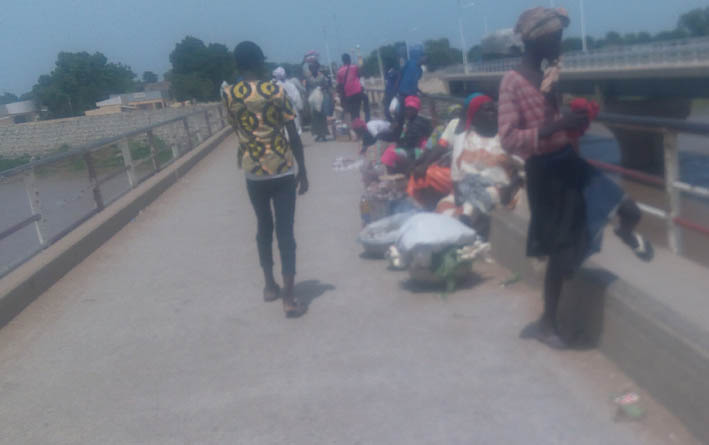The Ngueli Bridge, which connects Ndjamena, the capital of Chad, to Kousseri, a town in the far north of Cameroon, is used every day by hundreds of people from both countries engaging in trade or acquire goods that they do not find at home.
The permanent movements on both sides of the bridge give the infrastructure the appearance of an anthill in which people talk to each other, exchange courtesies and greetings, before embarking on endless haggling over consumer products and capital goods.
The first thing that dazzles while using the bridge from Ndjamena is the long queue of trucks laden with goods and waiting for their turn to cross the border.
Standing on the edge of the bridge, merchants hastily hail passersby.
A blue-yellow-red flag of Chad flutters in the wind at the entrance to the bridge, which is divided into two parts: one for pedestrians and the other for vehicles.
The flow of bridge users is incessant.
In addition to the ballet of cars, people walk around without luggage or with a basket in their hands.
Others hasten behind cart drivers carrying their goods.
Systematic searches are carried out on any packaging, big or small.
Pedestrians pass without any difficulty, usually on presentation of identification papers.
However, since the presence of Boko Haram in both countries, motorcyclists are no longer allowed to cross.
“You must park your motorcycle in a car park on the Chadian side before you are cleared to go to Kousseri,” a security agent says.
Once in Kousseri, Chadian traders buy goods from wholesalers like Alhadj Moustapha.
“There are traders living in Kousseri who come to sell of their goods in Ndjamena and Chadians who come to buy fruits (banana, avocado) peanuts, soap bars, among others, which are cheaper in Kousseri, in order to sell them back home,” he says.
Dame Djanabou, a Cameroonian woman who specializes in the loin cloth trade, will pick up her goods in West Africa before selling them in Kousseri and Ndjamena.
“Having many more customers is absolutely necessary if you want to dispatch some of the goods to Ndjamena,” she explains.
“Ndjamena and Kousseri are like twins. Traders and the population on both sides are happy with the closeness,” Ali Mbodou, a Chadian banana seller gleefully explains.
Fruits coming from Cameroon via Kousseri, allow many young girls and middle-aged women to engage in petty trading activities at the Ngueli Bridge and along streets of the Chadian capital.
Cameroonian and Chadian security agents benefit from this all-round trade by conducting unannounced checks during which they fine people without identification documents or merchants caught smuggling goods.
AHD/cat/fss/as/APA


